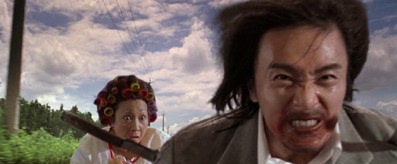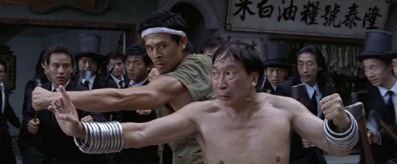|
"It's
no crime to be good at kung fu!"
The
2001 Shaolin Soccer firmly established
its star/director Stephen Chow as the king of
action comedy cinema for an international audience. Wildly inventive and frequently hilarious,
its over-the-top action and barmy special effects were a
joy in themselves, while its spirited ribbing of genre conventions
almost demanding a rethink on the part of those still taking
it seriously. With Jackie Chan's comedic combat swallowed
up and diluted by Hollywood, and Thailand's Tony Jaa set
to become the next big thing in play-it-straight martial
arts movies, the way is still clear for Chow to rule the
roost. If, of course, he can maintain the dangerously high
standards he has set for himself. On the evidence of Kung
Fu Hustle, this is not going to be an issue.
In
1940s Shanghai, the city is ruled by the all-powerful Axe
Gang, who have crushed all opposition, have the police in
their pocket, and are extorting money from businesses and
residents of every neighbourhood. All except one.
With little opportunity for financial gain, the slum district
of Pig Sty Alley has be left unmolested, its residents in conflict
with no-one but their fiercely stroppy Landlady. Enter the
hapless pair of Sing and Bone, who stumble into the slum
and attempt to cheat the local barber by pretending to be
Axe Gang big shots. When it all goes wrong, Sing accidentally
injures a real Axe Gang boss and an army of gangsters descend
on Pig Sty Alley, threatening a slaughter unless the culprit
is surrendered. To almost everyone's astonishment the gangsters take
an almighty beating from three of the locals, who turn out
to be kung-fu masters in anonymous retirement. So anonymous,
in fact, that they weren't even aware of each other's true identities
and skills. Beaten but vengeful, the Axe Gang hire two mysterious
assassins to dispose of the three fighters, but it turns out they
are not Pig Sty Alley's only martial arts masters...

And
this is just the start of it. Plot-wise, Kung-Fu
Hustle is considerably busier than the martial
arts average, with developments in Pig Sty Alley running
alongside Sing and Bone's fortunes as hapless Axe Gang apprentices,
and Sing's theft of goods and money from mute female ice-cream
seller Fong, unaware that he and she have a bit of a history. When the stories cross over the results are a
joy, as when Sing, required to make a killing as a gang initiation,
foolishly targets the Landlady and repeatedly pays the
price in a series of increasingly funny
gags – thrown knives bounce back into his shoulders, rattlesnakes
bite his face, and he is chased across country at express
train speed using the still protruding blades as rear-view
mirrors. For Chow, no gag is too outrageous or too visually
extravagant, and in this respect he tops even the explosive
madness of Shaolin Soccer in a climactic
whirl of fists, kicks and flying bodies, one particular
blow sending its victim so high that he is able to steady himself
on a passing bird before descending.
As
with Shaolin Soccer, Chow blends comedy
and action as if the two were blood brothers, the insanity
of the former allowing him to stretch the latter beyond
all credibility in a way that no straight actioner could come
close to getting away with. The passing of time and larger
budget has polished up the CGI, and genre maestro Yuen Woo-Ping
(Crouching Tiger, Hidden Dragon, Iron
Monkey, Wing
Chun and the like) choreographs the fights
and wire work as if they've been fuel injected with nitrous
oxide.
Chow
borrows from a wide variety of sources, the generic structural
and content influences of 1970s martial arts cinema sometimes
playing second fiddle to the physical comedy of Harold Lloyd
and Buster Keaton, the sequential pay-offs of Laurel and
Hardy, and the cartoons of Tex Avery and Chuck Jones.
Like Jones, Chow layers his jokes with a series of punch
lines, with a spectacular (CGI-assisted) fall through
multiple awnings topped off when a plant-pot falls on
the victim's head, then splits and leaves a single flower perched
on his noggin. This is expanded as the film progresses, resulting
in gag-on-gag sequences that prompted gales of laughter
in the cinema and leave you sometimes dizzy in wonder at
Chow's comic inventiveness. Elsewhere, the influences range
from the deliberately referential – the blood-in-the-lift
sequence from The Shining – to the altogether
less obvious – Jerzy Skolimowski's The Shout,
Mike Jittlov's 1980 short The Wizard of Speed and
Time, and even at one point Nakata Hideo's Dark
Water – but there is always the sense that Chow
is taking inspiration from his sources and creating something
new rather than merely repackaging them. He even references
his own Shaolin Soccer by having Sing (played by Chow) enter the film during a kids' football game and reverse expectations
by stamping on the ball and barking "No more Soccer!".

But
possibly Kung Fu Hustle's most pleasing
achievement is its casting of middle-aged kung fu stars
of past years in the key heroic and villainous roles, resulting in a film in which youth and ambition prove no substitute
for age and experience. Even the mighty Axe Gang are forced
to call on elderly would-be assassins in order to stand
against the retired fighters of Pig Sty Alley, and although
in the climactic fight the elders may defer to the recently
awoken abilities of a younger fighter, this is balanced
by his until-then unglamorous status as a bumbling idiot.
And if the mincing effeminacy of the Tailor's character
seems a bit much (and it does), then the revelation of his
very considerable fighting skills carries with it a rather
nice message about the consequences of passing prejudicial
judgment based on appearances alone.
If
the three-year gap between Shaolin Soccer
and Kung Fu Hustle seemed like a long one,
then it was worth the wait. The new film is an absolute blast from start
to finish, a furiously inventive and energetic live action
cartoon, gorgeously cinematic, and with the sort of comic
timing that the likes of the Farrelly Brothers can only
dream of. And as someone who groans at the announcement
of sequels, my heart is nonetheless lifted by the news that
Kung Fu Hustle 2 is already in pre-production.*
Framed
2.40:1 and anamorphically enhanced, this is a splendid transfer
– sharpness and contrast are pretty much bang-on and the
sometimes stylised lighting and colour scheme is handsomely
reproduced.
The
5.1 Cantonese soundtrack is also very nice, with plenty
of wallop at the lower frequencies and a good use of surround
speakers, with the music in particular coming off well here.
English
and Spanish dubs have also been included for the culturally
illiterate. As a non-Spanish speaker I can only testify
to the crapiness of the English dub. An English descriptive
track is also present.
The
Commentary with Stephen Chow,
Lam Tze Chung, Tin Kai Man and Chan Kwok Kwun is a lively
affair that covers a lot of ground, from the blocking of
scenes to the cinematography to the audience reaction, taking
in memories of the shoot and a few jokes, and a passing
comment on American food ("As you know, it sucks")
on the way. It can be quite hard to work out just who is
saying what at first, though you do start to tell the voices
apart after a while. The commentary is in Chinese with English
subtitles.
TV
Special – Behind the Scenes of Kung Fu Hustle
(41:58) is presented by actors Lam Tze Chung and Chan Kwok
Kwun, sometimes a little cheesily, especially when the two
are crudely chromakeyed over stills of the film. On the
whole, though, this is a fine extra that includes behind-the-scenes
and audition footage and segments on a variety of aspects,
including the score, the cinematography, the fight choreography
and the set designs. Chung and Kwun even demonstrate the
difficulty of washing out the hair oil used in the film
(known as 'The Unbearable') and, we are assured, in 1940s China.
There
are two Deleted Scenes – Pig
Sty Community Meeting (2:10) and Meeting Brother
Sum (1.59), both of which are non-anamorphic 2.35:1
and accompanied by the main Axe Gang theme, which was clearly
never intended for these sequences.
Ric
Meyers' interview with Stephen Chow (27:57)
has the author of Great Martial Arts Movies interviewing
Chow in English specifically for what looks like the US
DVD release. Like all of
the extras, this has optional English, Spanish and Dutch subtitles.
Outtakes
and Bloopers (4:47) is non-anamorphic 2.35:1
and also backed by the Axe Gang music and not as funny as
you'd expect or hope, but of interest nonetheless.
There
are 15 (!) TV Spots ranging from
15 to 62 seconds and are a mixture of Chinese and American
promos.
The
loftily titled International Poster Exploration
Gallery has 16 posters, all reproduced at
a decent size.
I
don't count the Trailers for Hitch,
D.E.B.S. and Layer Cake as they
are merely ads for other, unrelated DVDs.
It's
no exaggeration to describe Kung Fu Hustle
as far and away one of the year's most inventive and entertaining
films, a most worthy follow-up to Shaolin Soccer
and confirmation that Stephen Chow is still the king of
action comedy cinema, creating here a film that effectively
shows how lax products in both categories have become in
the West. If you haven't seen it yet then, seriously, what
have you been doing with your time?
The
film's UK region 2 DVD incarnation is very impressive, with
first rate picture and sound and some nice extras making
this a must-buy.
|